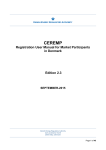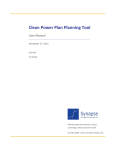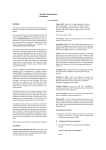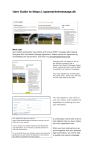Download Energy UK Response to Ofgem Open Letter on EU Regulation on
Transcript
Energy UK Response to Ofgem Open Letter on EU Regulation on Energy Market Integrity and Transparency (REMIT) 2nd May 2013 About Energy UK Energy UK is the Trade Association for the energy industry. Energy UK has over 80 companies as members that together cover the broad range of energy providers and suppliers and include companies of all sizes working in all forms of gas and electricity supply and energy networks. Energy UK members generate more than 90% of UK electricity, provide light and heat to some 26 million homes and in 2011 invested over £10 billion in the British economy. Main Points - - - - ACER and Ofgem should provide clear documentation to ensure smooth running of the registration process; Energy UK supports the development of transparency platforms; this will be particularly beneficial if the submission of REMIT and operational data can be combined, thus avoiding double reporting; The first priority in the GB market should be to establish effective national platforms; in the longer term an EU platform could be developed, but this needs to be carefully prepared; ACER should provide more comprehensive guidance in a number of areas, e.g. on the format of inside information disclosure and the treatment of >600 GWh/y customers; Energy UK is unclear about the rationale for including >600 GWh/y customers within the scope and believes that requirements should be minimised for these customers; A gas market threshold should be set for REMIT disclosure but Energy UK members have varying views about the appropriate level; ACER and national regulators should ensure and commit publicly to high standards of data security; It is essential that market participants are given adequate time to specify and procure the necessary IT systems. 1. Are there specific issues you would like the user manual to cover or other questions you have about registration? Given that unregistered participants are not allowed to trade in wholesale energy markets, it is important that the registration scheme operates smoothly and that the requirements on market participants are completely clear. An explanation of what parties are market participants would be helpful, even if this is outlined in other documents. For instance, it was suggested that the next edition of ACER’s Guidance on the application of REMIT would elaborate on final customers. 1 of 5 Our understanding is that market participants should register only in the member state where their registered seat and headquarters is located. A European scheme of this type has the important advantage of minimising administrative burdens but could mean that some of the concepts may be unfamiliar at national level, e.g. ultimate controller or beneficiary. For this reason we think that: - ACER should publish an FAQ document setting out definitions and covering any issues raised by stakeholders; Ofgem should publish a document providing any interpretation needed by GB market participants. Some points to be clarified are as follows: - Field 101: meaning of “natural person” as market participant; Field 120: inside information could potentially be provided in several places; Field 202: must three names be provided? Section 3: “ultimate controller” and “ultimate beneficiary” need to be defined; Processes for updating information need to be clarified. 2. ACER may make extracts of the participant register publically available, provided that commercially sensitive information is not disclosed. What registration data on market participants would you value being made public by ACER? What data would you be concerned about being made public in this way? We would agree that commercially sensitive information should not be disclosed. In addition, personal information such as addresses, passport details, normal place of work etc should not be published. We note that the information published by the FSA is fairly limited in scope and we would expect a similar approach to be adopted. We believe that it would be useful for market participants to understand the relationship between registered participants and related undertakings. 3. What do you see as the advantages and disadvantages of moving towards the use of transparency platforms, either at EU level, regional or national level? Energy UK supports the use of transparency platforms, which are an efficient and costeffective means of making the data available to the market. However, the impetus towards the use of platforms is weakened by the fact that market participants remain liable for publishing inside information even if the data has already been provided to a platform. As a result, market participants still have to ensure web publication of the data in any case, resulting in dual arrangements. If a solution could be found to this liability issue, this would be very beneficial both to market participants and regulators. We believe that the priority in the GB market should be to establish effective and robust national platforms for electricity and gas data. Energy UK supports the principle of using existing industry platforms for REMIT disclosure, as suggested in the current BSC P291 modification proposal. An important benefit of the platform route is that the submission of REMIT and operational (e.g. OC2) data could be combined, thus reducing administrative burdens. This approach also ensures consistency of data disclosure from market participants. 2 of 5 We would also emphasise the need to ensure that effective REMIT publication arrangements are developed in other Member States. Given the level of interconnection in much of the Continental market, it makes sense to adopt a regional approach. It would be logical to move towards an EU-level platform in the longer term but several potential problems are associated with this: - If a single EU platform is not reliable, it could potentially disrupt trading across the whole of Europe; experience with European platforms has not so far been particularly encouraging; There is a risk that such a platform could be developed without adequate involvement of market participants; We have seen significant innovation in the area of market data provision and a single platform could well prove to be significantly more costly and less aligned with the needs of market participants. A European platform will take some time to develop and may well not be ready on the timescales envisaged. Where a regional or EU-wide platform is used, consideration should be given to the use of the data that is currently being collected by TSOs and/or platforms at a national level, with a view to avoiding duplicate reporting. 4. Are there significant differences between the needs of electricity and gas market participants for a transparency platform? If so, what are these? There are some differences between the GB gas and power markets which will need to be reflected in transparency platforms, e.g. different licensing regimes, settlement periods and product characteristics. However, we do not see any significant differences between the information needs of electricity and gas market participants. 5. What are the characteristics of an effective transparency platform? Do you see any issues in using transparency platforms to meet your REMIT obligations? Platforms should meet the following requirements: - High reliability around the clock; Capability to deal with large volumes of simultaneous data inputs and mass simultaneous access; Cost-effectiveness; Prompt publication of data; User-friendly and downloadable format; Standardisation of data disclosure; Multiple input routes (conventional and internet); Use of data currently collected at national level so as to avoid duplicate input; Free access to all; Neutral operation. As the Electricity Transparency Regulation requires an EU platform, consideration should be given to whether this could also handle REMIT disclosure. 3 of 5 6. Who are the main users in your organisation of inside information disclosed by other market participants? What information do you need published on such platforms by all participants? Energy UK is not a market participant but we understand that the main users of inside information disclosed to the market are analysts, traders and operational and origination teams. The information published should include data required under REMIT and the EU Regulations on Electricity and Gas Transparency. We note that the requirements in electricity are particularly comprehensive and believe that these should be adequate for market purposes. We would, however, welcome a review that the data required under the Gas Transparency Regulation, e.g. on gas flows, is indeed being published across the EU. We would like to see ACER provide more comprehensive guidance on the data being requested and to whom the regulations apply (particularly when it comes to customers >600 GWh/y). 7. What is an appropriate GB gas market threshold for inside information disclosure and why? Energy UK agrees that it is important that national regulators should set a gas threshold for REMIT disclosure, as a means of providing greater certainty to participants. The gas market has a considerable influence on GB power prices and threshold should take account of that used for electricity, though we would not absolute consistency. market market so any expect Energy UK does not have a unanimous view on the level of the threshold: some members believe that the 10 mcm value currently used for real-time flow data at entry points should be used; others take the view that flows below this threshold are likely to affect prices and so a lower threshold should be used (albeit a higher value than in electricity, which could equate to around 1 mcm). 8. Other Issues Given the highly confidential nature of the transaction data required under REMIT, it is essential that ACER and national regulators should ensure very high standards of data security. There have been cases of “hackers” gaining access to EU ETS registries in some Member States and a large number of staff at energy and financial regulators across Europe could potentially have access to transaction reports. Energy UK would like to see ACER provide assurances to market participants that it will put in place comprehensive measures to restrict access and ensure data security. The delay in establishing the final transaction reporting requirements is a matter of considerable concern to Energy UK members. Market participants can only specify and procure IT systems when the data requirements and the characteristics of the ACER systems are known. It is essential that an adequate transitional period is allowed for companies to comply with REMIT reporting requirements. Otherwise substantial additional costs are likely to be incurred, bearing in mind that all EU market participants will have to procure the necessary systems from a limited number of vendors. 4 of 5 Energy UK does not understand why customers with “consumption capacity” >600 GWh/y are regarded as wholesale market participants under REMIT if they are not active in the wholesale market. It is important that the relevant provisions on registration and reporting are implemented with as light a touch as possible and that Ofgem works closely with the customers affected. In this respect we welcome the stakeholder engagement programme which Ofgem has already announced. There is inevitably some variation in the content and timing of REMIT disclosure between different companies. Given the political decision to introduce the REMIT prohibitions before data reporting and publication requirements were established, this could not have been avoided. The development of transparency platforms will bring about greater standardisation of disclosure formats. There would also be some merit in national regulators working together through ACER to provide market participants with better guidance on the data to be disclosed and the format to be used on individual websites and transparency platforms. Rules on generation and transmission outage planning are currently being established in the EU Network Code on Operational Planning and Scheduling. It is important that consideration is given to REMIT requirements on inside information disclosure when this Code is negotiated and that market participants have full clarity about what is required. 5 of 5
















